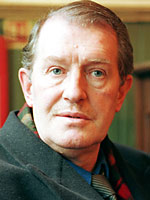
It is hardly surprising that Corin Redgrave became an actor. His father was one of the leading theatrical knights of his generation (which included Olivier and Richardson); his grandparents were also in the profession, as was his mother. His sisters Lynn and Vanessa are also leading lights, and they became a respected dynasty, but as with such a lineage, controversy, scandal and tragedy featured as much in their personal lives as it did in the parts they played. He virtually forsook his calling following a trajectory into radical politics, but finally returned to his roots, successful, rewarded, and respected. Redgrave was born in 1939 on the eve of the Second World War, and was christened after a character in As You Like It. His childhood was idyllic in Bromyard, well out of reach from the bombs that devastated London, a period he brilliantly evoked in 1995 via his unorthodox but touchingly insightful biography My Father, Michael Redgrave.
He painted a picture of plays being written and staged, often without his parents for an audience, since they were often in London working. From Westminster School he went to King's College Cambridge, where his acting contemporaries included Derek Jacobi and Ian McKellen. Excelling in the classics and in revue, he also graduated with a First in English. His name obviously facilitated the opening of certain theatrical doors, but his talent helped obscure the influence of his origins. He appeared as Lysander in Tony Richardson's critically mauled A Midsummer Night's Dream at the Royal Court in 1962, but fared better as Sebastian in Twelfth Night, making even greater strides in Arnold Wesker's Chips with Everything. Throughout the '60s he made substantial inroads in the theater, culminating at the Royal Shakespeare Company as Octavius Caesar in Julius Caesar.
He did have some outstanding supporting roles in films, including A Man for All Seasons and Oh! What a Lovely War. His interest in politics was initially fired by his involvement in the Campaign for Nuclear Disarmament. In 1975, following the collapse of his first marriage to Deirdre Hamilton-Hill, he earned the scepticism of many in his profession by his angry challenging of decisions made by the actor's union Equity. Redgrave became staunchly involved with the Trotskyite Workers Revolutionary Party, a fervor he shared with his equally political sister Vanessa. He moved to Yorkshire (their headquarters were based there), but as with many who become zealous he eventually fell out with the party he had once been so passionately committed to. His radicalism may now seem somewhat quaint, but it stalled his career and credibility for nigh on two decades. Redgrave strongly believed it also resulted in his being unofficially blacklisted by the BBC.
It was in the '90s that his career sailed into a second, more rewarding phase. He played King Lear at the RSC, though the reviews were mixed. But he earned fantastic plaudits in Tyan (2004), again at Stratford, in which he portrayed his father's least flattering critic. Although rarely a leading man in films, he shone as Andie MacDowell's husband in the wildly successful Two Weddings and a Funeral and took theatrical roles in Noel Coward and Tennessee Williams plays, earning critical and popular respect. He also appeared in numerous television productions such as Lynda La Plante's Trial and Retribution, and in the re-make of The Forsythe Saga. He never quite let politics go, forming the Peace and Progress Party in 2004, again with his sister Vanessa.
He stands as both an inspiration and a warning to his profession: A strength of conviction doesn't always further a career. His second marriage to Kika Markham bore him two sons, and gave him the grounding from which he reclaimed his true calling. He died in London on April 6, three months shy of his 71st birthday.
